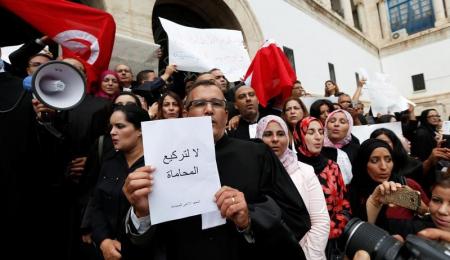
TUNIS (Reuters) – Tunisian lawyers went on their second strike in a month on Wednesday to protest against new taxes and tighter fiscal controls in the government’s proposed budget for next year.
Their walkout put pressure on a government already under fire over planned austerity measures including a public sector wage freeze, higher company taxes and new taxes for the liberal professions such as law, medicine and engineering.
It came ahead of an important international investment conference in Tunis next week, during which the teachers union said it was also planning a major protest.
Several hundred lawyers in court gowns protested outside parliament in Tunis as lawmakers debated the budget inside. “Lawyers are free … down, down with this law,” they chanted.
The parliament chairman received a delegation of the lawyers to discuss their demands. Lawyers said their colleagues in other cities around the country also went out on strike.
Under the government proposal, all lawyers will pay a tax ranging from about $8 to $25 on each file they present to court.
Tension over the budget comes as Tunisia prepares to hold an international conference in which it will offer $50 billion worth of projects to foreign leaders and investors.
The powerful UGTT labor union has threatened to hold a general strike and has called for protests against plans to freeze public wage increases.
The UTICA industry and business employers’ association, one of Tunisia’s major economic lobbying groups, has also rejected a proposed exceptional tax contribution on business.
Tunisia has been praised for its democratic progress since ousting strongman Zine El-Abidine Ben Ali in a 2011 uprising. But many Tunisians worry that taxes and austerity measures will exacerbate the economic difficulties they have experienced since then.
Under pressure from international lenders for reforms to cut spending, spur growth and create jobs, Prime Minister Youssef Chahed has proposed a broad package of initiatives, but he must also manage social unrest that the measures may trigger.
Tunisia expects to seek $2.78 billion in foreign loans next year – nearly double its 2016 external financing needs – to help cover a 2017 fiscal deficit projected to be 5.4 percent of GDP.
(Reporting by Tarek Amara; Editing by Aidan Lewis and Tom Heneghan)